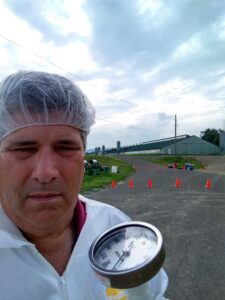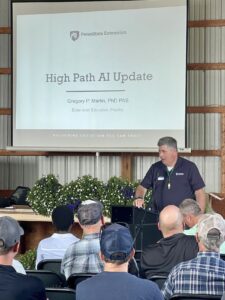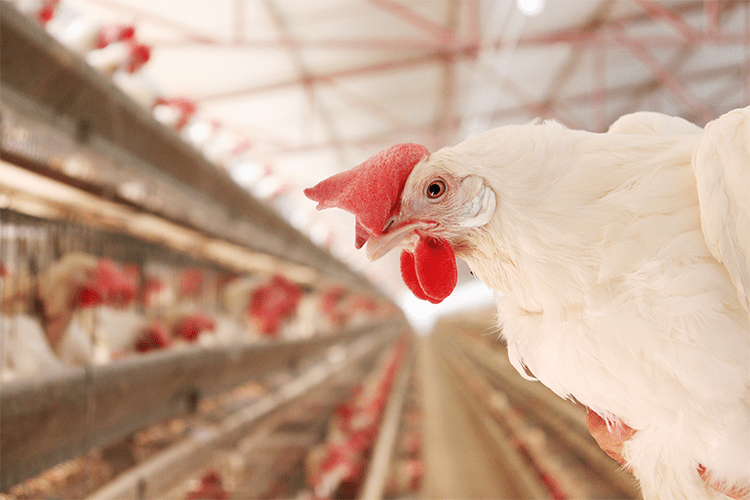There isn’t much Gregory Martin hasn’t seen or experienced while working with poultry producers in Pennsylvania. The Penn State Extension poultry educator is based in Lancaster County, which ranks among the top four counties nationally in sales of poultry and eggs. The county is the epicenter of the state’s $7.1 billion poultry industry, which encompasses large, vertically integrated companies and small commercial and backyard flocks, including those managed by the county’s large Amish population.

Gregory Martin, Penn State Extension poultry educator, stands in protective gear outside a poultry house where HPAI was detected. He displays a thermometer used to ensure that the interior of the compost windrows used to dispose of infected poultry carcasses reaches temperatures sufficient to kill the virus. Credit: Courtesy of Gregory Martin.
When a strain of highly pathogenic avian influenza (HPAI), carried primarily by wild waterfowl, ravaged U.S. poultry operations in 2015 — mostly in the Midwest — the Atlantic migratory flyway, including Pennsylvania, was spared. But a state-led HPAI task force, formed in the wake of this outbreak and composed of government officials, industry representatives and university poultry specialists, knew that this luck was not likely to last.
The subsequent emergency planning and preparation undertaken by the task force helped to mitigate the impacts when HPAI struck again in 2022 — an outbreak that has caused the loss of more than 7 million domestic poultry in Pennsylvania as of February 2025.
“We had an action plan on the shelf ready to go for a long time,” Martin, a task force member, said. “But just like the fire department, unless you practice, you don’t know exactly how that plan is going to work. So, we did a lot of planning and training, and we’ve been talking to producers about biosecurity plans since before 2015. But there were some who, perhaps, tuned us out after awhile thinking it wouldn’t happen to them. Nobody wants flood insurance until their house goes floating down the street, so sometimes the lessons are hard.”
Martin has assisted with biosecurity education and hands-on training for producers on the protocol for taking samples from birds for HPAI testing. And, due to his proximity to affected premises, he is often in the field helping to direct depopulation and disposal efforts, including the composting of dead birds to kill the virus.
“In a typical day, I would go out early and check on the construction of the compost windrows, and then monitor the windrows as they were ‘cooking,’” he said. “They would cook for 14 days. Then I would turn the pile and cook it again for another 14 days to ensure that we were killing the virus. On some farms, it was only one or maybe two rows, 300 feet long. But on one farm, there were 3 1/2 miles of windrow, and I walked every mile. During the height of the outbreak in 2022, I lost about 15 to 20 pounds sweating in my protective suit.”
The work took a toll on him. “I literally saw millions of dead birds for over a year,” Martin said.
His Penn State Extension colleagues noticed his stress and fatigue — and spoke up.
“I have the best people working with me here in Lancaster County,” he said. “They notice things I might miss. Despite looking in the mirror every day, I didn’t see how tired I was.”
A colleague told Martin he looked exhausted and suggested he take a break. Martin took a week off to catch up on much-needed sleep.
“Taking proper care of yourself, getting plenty of rest and taking breaks helps,” he said.
Being at his best also helps him assist industry colleagues who have suffered losses due to avian flu. When the manager of a Pennsylvania poultry farm lost her entire flock, her job and her housing all in one day, she fell into a crisis. Fortunately, Martin was there to offer crucial support. “You’re the first person to actually talk to me about this,” she told him.
The farm manager lived in a house on the farm property. When avian influenza hit, the entire farm shut down. Millions of birds were lost, and the farm would be out of production for a long time. The manager was scrambling to find work and a place to stay. She had lived there for more than 25 years.

Gregory Martin, Penn State Extension poultry educator based in Lancaster County, provides producers with an update on highly pathogenic avian influenza. Credit: Courtesy of Gregory Martin.
To assist her, Martin called on his “Mental Health First Aid” training from Extension. Using an evidence-based curriculum from the National Council for Mental Wellbeing, this training outlines action steps for helping others and emphasizes the importance of mental wellness and reducing stigma. Participants learn skills for providing initial emotional support, offering practical assistance and connecting individuals to appropriate services.
“Mental health first aid training helps us recognize stress in people and empathize with them,” Martin said. “We’re not psychiatrists, but a resource to connect people with the right help.”
Active listening is crucial to show empathy and fully understand concerns, he pointed out.
“For her, it was about finding shelter and work,” he said. After their conversations, he added, she felt more calm. Subsequently, concerned individuals who became aware of her plight found her a job, and she landed on her feet.
Martin recommends this training for anyone in agriculture’s support structure.
“The bank loan officer, the equipment supplier — they need this training,” he said. “The more people know, the better our community can support agriculture. We’re always one disaster away from collapse, so it’s important to be sturdy, prepared and able to handle whatever comes.”
Recognizing this need, Penn State Extension offers a variety of mental health resources tailored to the agricultural community. Martin compares these resources to a seatbelt in a car.
“You never know when you’ll need them,” he said. “But when you do, you need them immediately.”
More From: avian influenza, Northeastern Region, Penn State University, PennsylvaniaShare this Post

